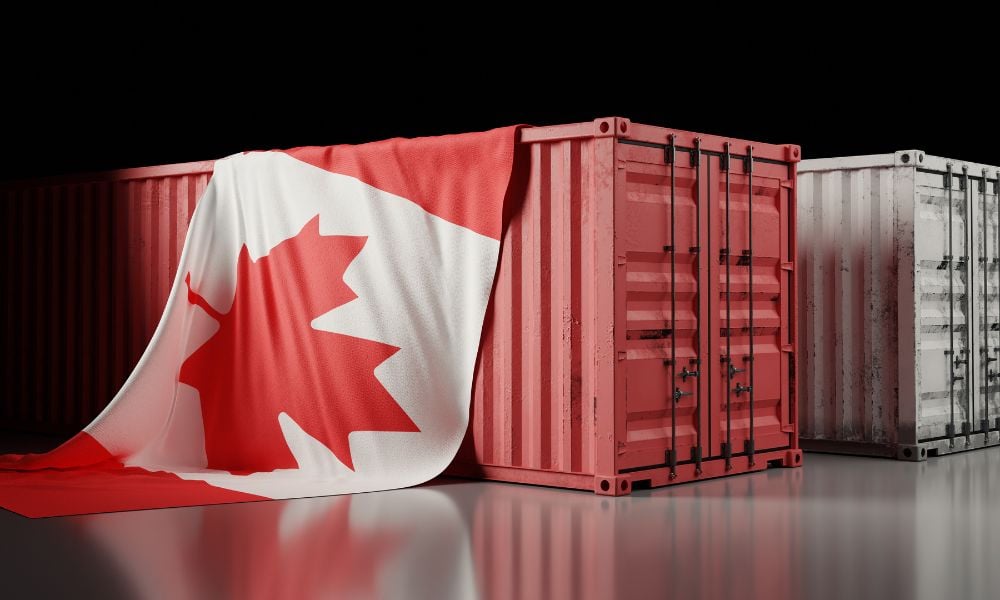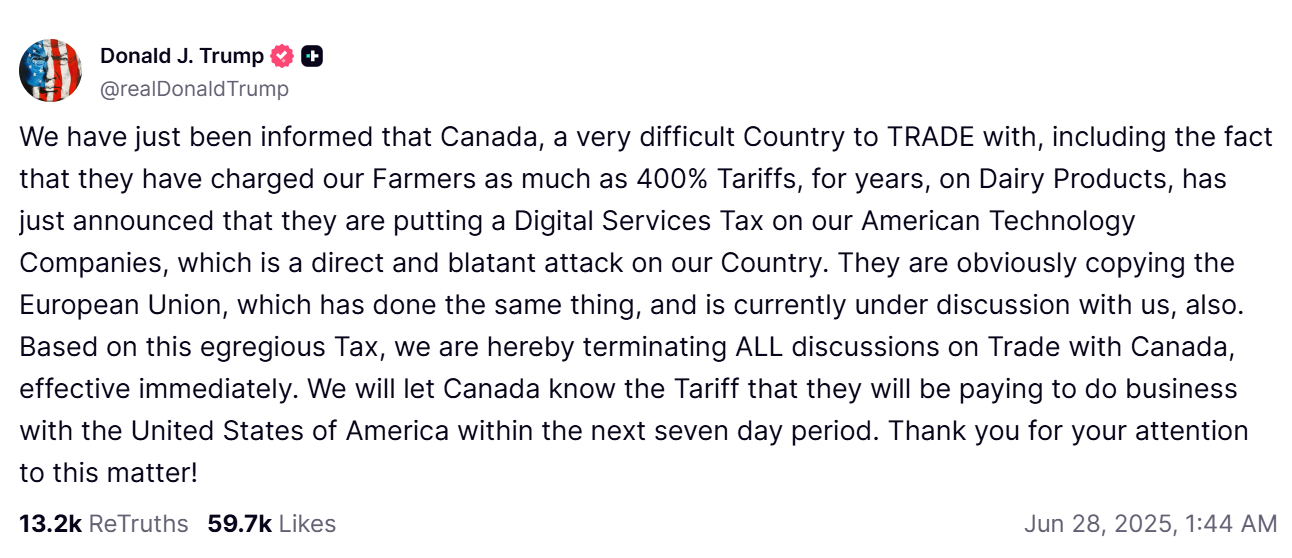Ottawa pulls back digital tax after Trump vows new tariffs within a week

Canada rescinded its Digital Services Tax (DST) just days before first payments were due, after US President Donald Trump abruptly ended trade talks and threatened new tariffs on Canadian exports, calling the levy a “direct and blatant attack” on the United States.
Trump announced the decision Friday via Truth Social, stating: “We are hereby terminating ALL discussions on Trade with Canada, effective immediately.”

Source: Donald J. Trump @realDonaldTrump via Truth Social
He added the US would “let Canada know the Tariff that they will be paying” within a week, as reported by BNN Bloomberg.
The Canadian government, which had previously vowed to move ahead with the DST despite US opposition, reversed course Sunday.
According to a statement from Prime Minister Mark Carney, rescinding the DST “will support a resumption of negotiations toward the July 21, 2025, timeline” set at the G7 summit in Kananaskis.
CNBC reported that Finance Minister François-Philippe Champagne said the decision “will allow the negotiations of a new economic and security relationship with the United States to make vital progress.”
The tax, enacted in 2024 and retroactive to January 1, 2022, imposed a 3 percent levy on revenues from digital services earned in Canada by firms with global revenues exceeding $820m and domestic revenues over $14.7m.
According to Al Jazeera, the tax targeted large tech companies such as Amazon, Meta, and Google, and its retroactive nature sparked criticism across the border.
Trump’s reaction included threats of retaliatory tariffs on Canadian goods and an investigation under Section 301 of the US Trade Act.
In the Oval Office, he said the US held “all the cards” in the economic relationship, calling Canada “a very difficult country to trade with,” as per BNN Bloomberg.
The DST had long been controversial.
CNN reported that 21 US members of Congress had urged Trump to pressure Ottawa to drop the measure.
Former US Trade Representative Katherine Tai previously called the tax “discriminatory.”
Joel Kaplan, Meta’s chief global affairs officer, publicly praised Trump for “standing up for American tech companies,” as reported by The Globe and Mail.
The Canadian government had defended the levy until the reversal.
Champagne told reporters on June 19 that “we’re not there at all” when asked if Canada might scrap the DST. He called it “neutral” and not aimed at any one country, according to CTV News.
Industry groups expressed concern over the DST’s impact on bilateral trade.
Goldy Hyder, president and CEO of the Business Council of Canada, said in a statement to CNN that “for many years” the group had warned the DST could “undermine Canada’s economic relationship with its most important trading partner.”
Canada also moved to impose a steel quota and a 50 percent surcharge on US imports exceeding that quota, in response to US tariffs.
The measure took effect immediately Friday, and according to a federal release cited by Time Magazine, was aimed at stabilising Canada’s steel market.
Although Carney and Trump had agreed at the G7 summit to finalise a trade and security deal within 30 days, Trump’s announcement halted momentum.
He reiterated to Fox News that talks would remain off “until such time as they drop certain taxes.”
Former Liberal finance minister John Manley told CTV News that Canada should view the DST as “expendable” and use it as leverage in future talks.
Former Quebec premier Jean Charest added that “we shouldn’t be jumping up and down every time Mr. Trump says something,” but acknowledged the president’s tactics should be taken seriously, as per The Globe and Mail.
The Parliamentary Budget Officer estimated the DST would raise $7.2bn over five years.
But former finance minister Bill Morneau had suggested the measure was a sticking point and should be reconsidered to advance US–Canada negotiations, according to CTV.
Despite past tensions, the Carney government remains committed to a resolution.
The Prime Minister’s Office stated that Canada will “continue to engage in these complex negotiations… in the best interests of Canadian workers and businesses,” as reported by multiple outlets including NBC and BBC.



